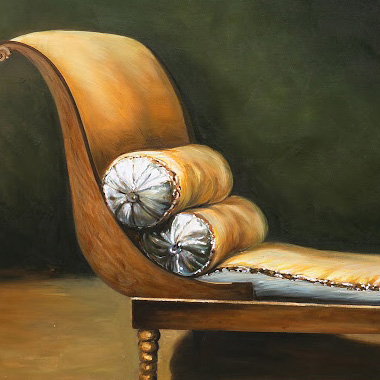
S.
D.
Themlitz

Rosa Carvalho’s work revisits classic paintings to re-read one of the genre’s most recurrent themes: the representation of women and of the female body in art history. She combines landscape, religious, mythological, sublime and oneiric paintings with surrealist, mannerist, baroque and rocaille influences in an erudite, critical and ironic body of work.
In the series “Paisagens de Interior” [Interior Landscapes], Rosa Carvalho takes up iconic paintings presenting naked female figures in delicate and diaphanous poses by universally acclaimed masters such as Rembrandt, Boucher, Velásquez, David and Goya, rigorously, laboriously and faithfully re-staging these works with the exclusion of the female body, thus frustrating carnal desire and voyeuristic consumption. The liberation and removal of the central element of each painting gives the original model a life of her own, emancipating her as a woman.
With a purpose and will beyond an availability to be passively gazed upon, she is thus finally “de-objectified”. The game of making an absence into a presence is similar to that of turning incarnation into disembodiment, a theme at once religious and related to genre – an operation that Rosa Carvalho subsequently takes even further in her hyper-realistic paintings of food, notably in Posta [Chop], in which painting literally becomes flesh.